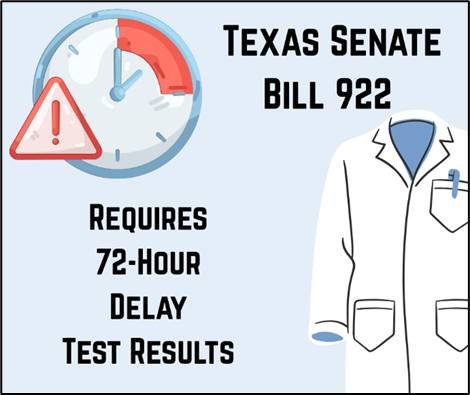HUTTO, TX — When 47-year-old Maria Alvarez checked her patient portal during a lunch break, she expected routine bloodwork results. Instead, she was met with a clinical note: “Suspicious mass consistent with malignancy.” No phone call. No explanation. Just a few lines of medical jargon—and a wave of panic.
“I was sitting in my car outside the grocery store,” Alvarez said. “I didn’t even know what the words meant at first. I Googled them. Then I cried.”
Her physician hadn’t yet seen the results. Under federal rules, the lab was required to release them immediately. By the time the doctor called two days later, Alvarez had already spiraled through worst-case scenarios, alone.
Stories like hers prompted the Texas Legislature to pass Senate Bill 922 , which took effect September 1, 2025. The law requires a 72-hour delay in the electronic release of certain sensitive test results, including those that may indicate cancer, genetic risk factors, or other serious conditions.
What the Law Changes
Under SB 922:
• Sensitive results will be withheld from patient portals for up to 72 hours, giving providers time to review and prepare.
• Routine results—like cholesterol or basic labs—will still be released immediately.
• Providers may still share results directly with patients before the delay ends, if appropriate.
“This isn’t about withholding information,” said a spokesperson for the Texas Medical Association. “It’s about ensuring patients receive life-changing news with context, compassion, and support.”
The law responds to unintended consequences of the 21st Century Cures Act, a federal mandate that required immediate release of test results to promote transparency. While well-intentioned, the policy led to thousands of patients receiving serious diagnoses—like cancer or Huntington’s disease—without warning or guidance.
Physicians across Texas reported cases of:
• Patients misinterpreting results and assuming the worst
• Emotional breakdowns triggered by raw data
• Missed opportunities for doctors to prepare patients for next steps
SB 922 aims to restore a critical buffer between raw data and human impact.
What Patients Should Know
✅ Most routine results will still appear immediately
✅ Sensitive results may be delayed for up to 72 hours
✅ Providers may still contact patients directly before portal release
✅ The goal is to protect patients from unnecessary trauma
Healthcare providers across the state are updating their systems to comply with the new law. Patients with questions are encouraged to contact their clinic or hospital directly.
As for Alvarez, she supports the change.
“No one should learn they might have cancer from a screen,” she said. “We deserve better than that.”




I don’t think that was the intent of the law. I think they want to give doctors enough time to review a patients case.